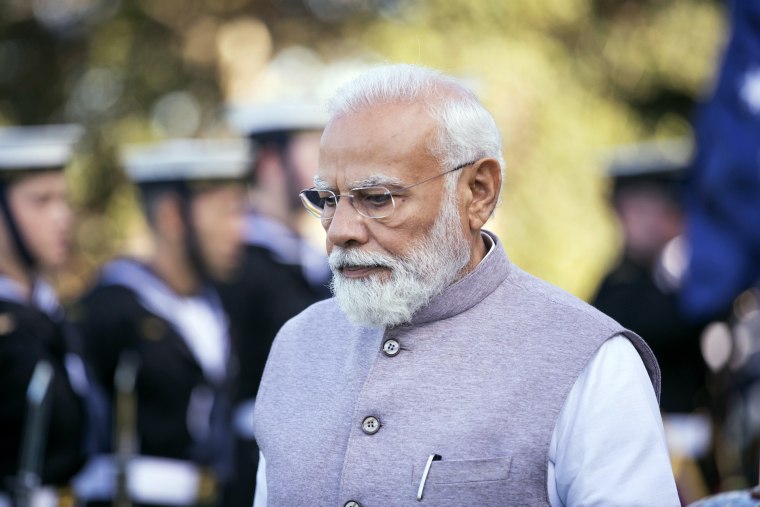nbcnews.com 22 June 2023

Narendra Modi during a welcome ceremony at Admiralty House in Sydney, Australia, on May 24, 2023.Brent Lewin / Bloomberg via Getty Images file
Many South Asian Americans have mixed feelings as they prepare themselves for Indian Prime Minister Narendra Modi’s state visit to the White House this week.
As some get ready to gather in Washington, D.C., both to welcome and protest him, data from a 2021 study underscores just how torn the diaspora is when it comes to the controversial leader — and shows that his popularity among Indian Americans falls short of how he’s received in India.
This week marks Modi’s first official state visit to the U.S., which had not invited an Indian prime minister since 2009. Modi was once banned from the U.S. for the role he allegedly played in the deadly Gujarat riots, which left 1,000 people, mostly Muslims, dead.
For many community leaders, a historic moment is severely marred by this and other aspects of Modi’s human rights record, including censoring journalists and he stripping autonomy from the region of Kashmir.
“For this kind of a ruler to be invited to a state dinner by an American president and to be given an opportunity to speak to a joint session of Congress, where he’s going to talk about the ideals of democracy, is just mind-boggling,” said Ajit Sahi, advocacy director for the Indian American Muslim Council.
The study, conducted by the Carnegie Endowment, showed that Modi’s approval rating is much lower among Indian Americans (50%) than among Indians living in India (77%). Dozens of lawmakers in both bodies of Congress signed a letter urging President Joe Biden to address human rights concerns with Modi during his visit.
“This is an important relationship that we need to continue and build on as it relates to human rights,” White House press secretary Karine Jean-Pierre said at a briefing last month.
Though Sahi said Hindu nationalist sentiment in diaspora communities cannot be ignored, he thinks college-educated young people who grew up in the U.S. are distancing themselves from Modi’s politics.
“The American values of liberalism, progressivism, equality for all, justice for all, equality before the law, I think these are the things that more or less get deeply rooted in the psyche, especially if you were born and raised here,” he said.
But the diaspora in the U.S. is still split down the middle in terms of support for the prime minister. According to the study, 49% of Indian Americans rate Modi’s performance favorably, either strongly approving or approving of him; 31% disapprove of his performance, and 20% expressed no opinion on him at all.
“It’s a polarized space,” said Sunita Viswanath, co-founder of civil rights group Hindus for Human Rights. “There’s very little scope for bridge-building. … On the one hand, you have this mainstream Hindu response, which is that India’s national leader is coming to town and is being greeted by the American president with a state dinner, and that puts India on the map.”
On the other hand, those in minority religions and castes oppressed in India say the visit feels like the U.S. validating the structural bias their families face, Viswanath said. In diaspora spaces, many say that bias has followed them.
“Inclusive secular democracy means the right for all the different religions to exist and practice freely,” she said. “We are Hindus, we are proud Hindus, but our Hinduism and our devotion to secular democracy, whether it’s in America where most of us live or in India, where most of us are from, that is what is motivating us.”
